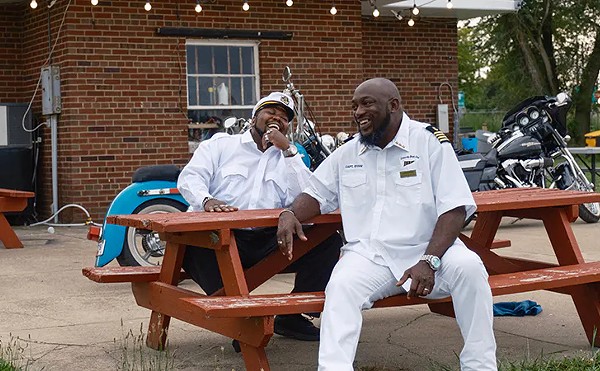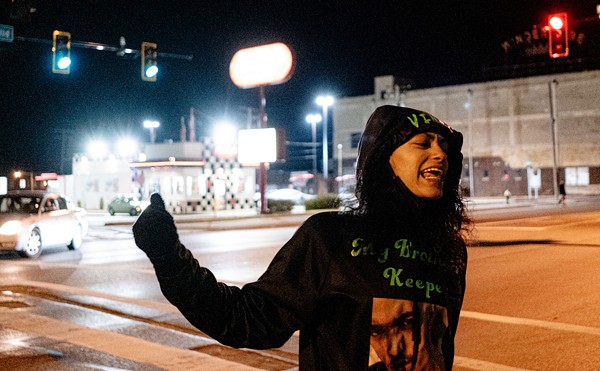"Damn, look at his clubs," Wollmann says, as the 7-foot-3 Ilgauskas walks by carrying a bag of what look to be javelins with iron heads attached.
Wollmann returns to his ziggurat of golf balls. He comes to the Range at Avon, which is open to the public, because he doesn't belong to a country club. Never has. A firefighter's son, he learned the game at a municipal course in Parma that only installed fairway sprinklers a few years ago. "If it didn't rain, it was like playing on concrete," he says.
He pulls out his driver. His scythe of a swing sends the ball screaming. It lands 300 yards away, a black dot on the horizon. Even by professional standards, he hits the crap out of the ball. The wet ground under his feet turns to muddy green oatmeal as he lifts drive after drive into the blue.
Wollmann turned pro in 1998, a few months before his 23rd birthday, poised for great things. He was a second-team all-American at Ohio State and captured the 1995 U.S. Amateur Public Links Championship. The Professional Golf Association Tour, the manicured land of camera shutters and six-figure checks, beckoned.
Thus far, a tan and a worn road atlas are about all he has to show for his efforts. A few weeks ago, he drove 12 hours round-trip to attempt to qualify for a tournament. The week before that, he cashed in a relative's flight coupon to reach an event in Tennessee. He doesn't even have his own place. For the last four and a half years, his sister, who has a husband and two kids, has put him up at her house in Strongsville.
"He was the baby of the family," sister Patty Zingale says. "I remember taking care of him when he was little . . ." She pauses, not sure that she wants to finish the joke. "And now I'm taking care of him when he's old."
On its face, a 27-year-old man living with his sister is pathetic, but Wollmann is so close to the big time, no one questions the arrangement, including Patty's husband. He's got more game than Parker Brothers and the unflappability of an astronaut. One day, Patty says, her brother will be famous. For now, it's the spare bedroom and a used Oldsmobile.
"If I didn't think I could play out there," he says. "I wouldn't bother."
On Sunday, May 12, Wollmann completed the final round of the Lewis Chitengwa Memorial Championship in Charlottesville, Virginia. Who is Lewis Chitengwa? Who the hell knows. The "championship" is an event on the Canadian Tour, which for climate purposes is actually played in the U.S. and Mexico until late May.
In the golf hierarchy, the Canadian Tour is like Double-A baseball. Players scrounge for shares of the $150,000 prize money each week. In eight events, Wollmann has won $7,728. On the PGA Tour, by contrast, weekly purses routinely top $4 million. The perks aren't bad, either. The PGA Tour is a roving spa of free dry cleaning, massages, and carrot cake. When the tour stopped in Washington, D.C. for an event this summer, some players whined that their courtesy cars weren't left idling at the airport.
The Canadian Tour offers nothing in the way of loaner Cadillacs or omelet stations. At Charlottesville, Wollmann made $750 for finishing 45th. Yet between travel, lodging, meals, and entrance fees -- he picks up the entire tab -- his road expenses run about $1,000 a week. To keep the Visa statement from growing fangs, he occasionally splits a hotel room with another pro or stays with golf-loving families who volunteer to host visiting players. Some tournaments aren't worth the effort it takes to get there. He's skipping the Canadian events west of Ontario to avoid the airfare and the nonresident tariff. "You're playing for peanuts, and they tax the shit out of it," he explains.
After finishing 45th, Wollmann puts his clubs into the trunk of a white Intrigue the dealer used as a demo and drives eight hours back to Ohio. The odometer clicks to the narration of books on tape and the radio. He slumps through the door, catches some sleep, and rises early for an 8:30 a.m. tee time in an attempt to qualify for the U.S. Open, one of golf's four major tournaments.
More than 100 guys show up in rain gear at Red Tail Golf Club in Avon. At 6 feet 1, Wollmann stands an inch or two above most players. He's Eastern European handsome, the kind of blue-collar look nurses find attractive. He wears a Titleist brand hat, though he's not paid to. He has, in fact, no endorsements.
Two Teamsters make up his cheering section. Older brother Kenny, who drives a UPS truck, and Kenny's softball buddy Randy Mayher (Plain Dealer circulation) follow his round, a cloud of cigarette smoke above their heads. "He's going to need miracles," Kenny assesses after Chris stumbles to four over par after six holes. "Big-time miracles."
By the turn, where the Teamsters grab Bud Light tall boys from the clubhouse, Wollmann's game begins to hum. He plays par golf for 10 holes and then makes a birdie on the 16th. On any other day, three-over is a cruddy score for him, but the spring mist has turned bitter and jagged. Golf in this kind of slop adds the component of wilderness adventure. Players fuss to keep their hands and equipment dry; water sends balls squirting off clubfaces. "Kayak golf," a guy in Wollmann's group grumbles after bunting a stray drive back into the fairway.
By the 18th, players hold their umbrellas like battering rams to fight the sideways rain. In a few minutes, play will be suspended. Wollmann, unfazed, makes another birdie to finish with a 74.
All things considered, it's a gallant performance. Conditions are so wormy, one player shoots a 106 -- a remarkable number, since the field was limited to professionals and amateurs with handicaps of two or lower. The qualifier resumes the next day to blue skies, but flag-snapping winds. Of the 127 players who entered, 56 don't turn in scorecards; they either quit or were too embarrassed to post a fat number. Only one player bettered Wollmann's 74.
As the guy who shot 106 could tell you, golf forgives no sins. In other sports, athletes can atone for a flub on the next serve, the next at-bat, the next trip down the court. Golf has no do-overs. Every shot counts. You play it as it lays until you get it in the hole. Mark Twain famously called golf "a good walk spoiled." Occasionally the game's inherent frustrations grab Wollmann. On one hole, he struck a shot that made a splashy thud. "Fucking casual water!" he yelled as the ball, moisture spinning off its dimples, landed short and left of the green.
But he seems incapable of pouting. If his house burned down, he'd probably curse, roll up his sleeves, and start sifting through the debris. While competing in the NCAA Championship, Wollmann plopped two balls in the water on a par-3 en route to a quadruple bogey. "A lot of players would have packed it in right there," says OSU's longtime golf coach Jim Brown. Wollmann made up for his misadventure with four birdies in the last seven holes.
"He can have a completely horrible day, and he might be quiet and a little depressed," says girlfriend Amy Roberts, who met Wollmann through mutual friends last fall. "But he gets up on the horse the next day and does it all over again."
His disposition may have something to do with his upbringing. The youngest of four by 11 years, Wollmann was the baby of the family, but babied is not the same as spoiled. The Wollmanns lived on Hollywood Drive, which borders Ridgewood Golf Course. When Chris was 10, his father, Gene, bought him a set of Chi Chi Rodriguez kiddie clubs, then a bag of lady Dunlops. His birthday present every April was the $150 it cost to play unlimited rounds at Ridgewood, where jeans and T-shirts pass the dress code. He'd ride his bike to the course and play as long as the sun allowed. "We were there 16, 17 hours a day," says fellow Ridgewood rat Damon DeMarco. Wollmann was four years younger than DeMarco and his friends, but by age 13, he was beating them regularly.
Dan Panek, then the pro at Ridgewood, once barred Wollmann from the course for two weeks. (Panek doesn't want the reason for the suspension printed; suffice it to say Wollmann didn't react well to a missed putt.) He kept showing up anyway, first asking if he could chip and putt on the practice green, then begging permission to play the course. Panek tired of saying no. "Finally, after a week, I just said, 'Go ahead.'"
Wollmann played other sports, but by high school, it was obvious he excelled at one in particular. One Saturday morning, Gene showed up at Chris's freshman basketball practice, pulled the coach aside, and muttered something about an emergency.
"What is it?" Chris asked when they left the gym.
"Nothing," his dad said. "Let's play some golf."
As a sophomore, he won the state high school championship. The next two years, he finished second and third -- not bad for a kid who played a course that didn't have a practice range. Wollmann is asked if he enjoyed beating up on the kids whose daddies belonged to country clubs. "You said it; I didn't," he replies with a smile.
Pulling a brash quote from Wollmann is like watching C-SPAN for laughs. A few weeks ago, he and other former Ohio State players who turned professional teed it up at a pro-am to benefit the school's golf program. He shot 65 -- a score matched only by Chris Smith, who won a PGA event earlier this year. He mentions none of this the day after, only saying, "I'm playing good." Apparently, this is routine. "He said the same thing to me when he came home," his sister says.
Wollmann is faintly more expressive when he's "playing shitty."
"When he plays good, he doesn't say much," brother Kenny explains. "When he plays bad, he doesn't say much."
Kenny made the trip to Stow, Massachusetts, site of the U.S. Public Links tourney Chris won in '95. The day before the finals, reporters looking for Chris didn't find him. "He was gone," Kenny says. "He was with me, playing video games."
Tiger Woods is supposedly under pressure to win a Grand Slam -- all four major tournaments in the same year. Pressure? A guy who makes $20 million a year just to wear Nike swooshes is under as much pressure as Prince William is to find a job after university.
No, real pressure -- the kind that turns saliva into cotton, stomachs into flasks of acid -- is the PGA Tour's qualifying school. Held every fall, Q school grants the top 35 finishers the privilege of playing the tour the next season. Last year, more than 1,200 players competed for the precious spots. So many guys apply, Q school is held in three stages; it's a death march, with fresh towels. The final stage is a six-day marathon held in La Quinta, California. "There aren't too many guys smiling at the end of that week," says Lakewood Country Club pro Rob Moss, who played in 10 straight Q schools, never to wear the sated grin.
In 2000, Wollmann scraped through the first two stages. One stroke worse at each session and he would have been sent home. He reached the finals and finished in a tie for 68th, four shots from the group who received PGA Tour cards, which are virtual treasure maps. Per-Ulrik Johansson -- No. 100 on this year's money list -- has made $397,394.
By making it to the finals, Wollmann at least qualified for Buy.com Tour privileges. While not the big tour, Buy.com is the next best thing. The prize money from week to week runs about a half-million dollars. Wollmann was cut a $20,400 check for finishing fourth at an event in Knoxville. Still, what should have been his breakout year was more like hives. Desperate to improve his standing on the money list, he played in the last eight tournaments without taking a week off. The hotel rooms started to blend together. He'd wake up and not remember if the city beyond the drapes was Odessa, Boise, or Rancho Cucamonga.
Wollmann had little choice other than to push himself. He needed the money. Aside from covering the Sleep Inn bill, earnings set the next season's playing privileges, what the pros call "status." But he played worse down the stretch than he had all season. He finished the year in 83rd place and lost his card.
For the season, he made $48,592. He also claimed $46,000 in expenses.
"It's my own fault," he says. "I didn't play good."
He missed the Q school finals altogether last fall, by a single shot. Afterward he didn't touch a club for a month and a half. "That kinda sucked."
Sucked indeed. Professional golf is wicked in that it's not just you against the course, it's you against 125 other prodigies who dominated whatever Ridgewood they came from. "There's just so many good guys," says Akron native Brian Unk, a three-year Canadian Tour player. "You've got to play your best golf, because if you don't, somebody else will."
A low-grade paranoia bites at his words. In golfers' minds, other guys are always practicing harder, entering more events, willing themselves into better players. In taking time off, they risk leaving a hot week on the couch that could vault them 50 spots on the money list. Better take advantage, because, as Unk says, "You're only going to have your 'A' game a couple of times a year."
Unk is among the 500 best players in North America, but he supplements his income by giving lessons at a driving range. Before settling in at Lakewood CC, Moss played on the Asian Tour, catching puddle jumpers and buses to courses in Malaysia and Myanmar. He learned to stretch his laundry like rations and play in 95-degree heat. "It was like a tour of duty, almost," he says. At this level, golf better resembles pool hustling than the Mercedes/Michelob/MasterCard-sponsored glitz seen on TV. Early in his pro career, Wollmann relied on the mini-tours, where guys essentially play for each other's entry fees. He heard of one event where the organizer made off with the $15,000 kitty.
Wollmann couldn't imagine doing what he does with a family to support: Sorry, honey, I threw up on myself on the 17th. Any chance we can run the baby's diapers through the dishwasher? He and Roberts, his girlfriend, seem to have an understanding. He doesn't brood over lipped putts at dinner, and she doesn't mist up every time he packs a suitcase. "Yeah, it's hard," she says. "But I'm willing to work at it."
When they first started dating, she dreaded telling her father that Chris was an aspiring pro golfer. She previously dated a guy who wanted to race cars, and she worried her dad would think she had a weakness for sporting fantasists. Wollmann won him over. Even to a protective father, he radiates capability.
"I honestly don't think he'll ever quit," Amy says.
After surviving the regional qualifier at Red Tail, Wollmann failed to make it through the next stage and into the U.S. Open field. He finished in the middle of the pack at the sectional in Maryland. ("I played good. I just putted horribly.") So, as Tiger Woods kissed the Open trophy, Wollmann was in Huntsville, Ontario, picking up a $2,550 check for a 15th-place tie.
He broke off I-90 on the way home and tried to qualify for a Buy.com tourney at Peek'n Peak Resort in Findley Lake, New York. He had been looking forward to June and July, when the Buy.com Tour reaches the Midwest. Each event has a Monday qualifier, open to all pros willing to put up $200. For the Lake Erie Charity Classic, 122 guys showed up, vying for just 14 spots. Wollmann shot a 67. He was in.
The course sits on top of a ski mountain, and on the first tee of Thursday's opening round, Wollmann's countenance matches his surroundings. He looks confident, expectant, back in his element. As a lowly qualifier, he is assigned to the last group, which includes a recent Penn State grad who had been playing in South America and a club pro who burns a Camel filter every other hole and has his wife for a caddy.
The day begins poorly. Wollmann's ball keeps sneaking into bunkers and long grass. At the sixth hole -- sponsored by Joe B's Carpet -- he holds the follow-through on his approach shot, striking a pose. The ball lands four feet from the pin, but fueled with backspin, it curls off the green. He settles for par.
He is two-over at the turn. Guys are shooting low numbers. At this rate, he won't make the cut, the guillotine that drops on the bottom half of the field after two rounds.
But on the back nine, just as it had at Red Tail, his game snaps to attention. His drives split fairways, his approaches pin-cushion greens. He makes two consecutive birdies to reach even par. By this late hour, the already small crowd has thinned to a few stray souls. About the only people left on the course are the players, caddies, and sun-dazed volunteers. The Buy.com Tour may be a leg up from the Canadian, but it is still the minor leagues.
Wollmann finishes the round with pars. He could have shot lights-out, but for his putting. The greens were trampled by the time his threesome played through. "It was like a fucking Plinko board," he says.
Still, as he sits down for a beer and a shrimp-and-pasta dish at T.G.I. Friday's after the round, life is good. A $425,000 purse is at stake, and his game is as crisp as it has been in a year. "I had fun today," he says. "It's a good feeling to play good. I get paid to play golf. Think about it."
Days like this nudge aside the melancholy of his present station. Guys he played against as an amateur are on the big tour, earning more for wearing a visor than he will earn in prize money. This fact might digest easier if he knew they were much better players. They're not. But for a few loose shots and offline putts at Q school, he'd be among them. Wollmann doesn't need to improve his game as much as to play his best at the right time -- a notion that is at once reassuring and maddening. "You always wonder if you're ever going to get out there. It's always in the back of your mind."
If he doesn't make it, it's unlikely he'd become a club professional, catering to members' needs for low pay and long hours. He bumped around Columbus long enough to earn a marketing degree. The diploma stays in the closet, for now and for the foreseeable future. In his favor, the hands of time don't pull at golfers as they do, say, tennis players or boxers. A number of pros reach their peak after they turn 30, though Wollmann would prefer not to wait for the journeyman's ballad to cue.
"I want to get out there," he says. "I'm tired of watching it on TV."
Sister Patty keeps a photograph on the wall of her house. Taken at the 1996 Masters, the picture shows Wollmann standing next to another amateur, a skinny Stanford kid named Tiger.
"We thought it would happen a lot sooner, but it will happen," she says. And when he leaves, "My kids will probably be heartbroken."











